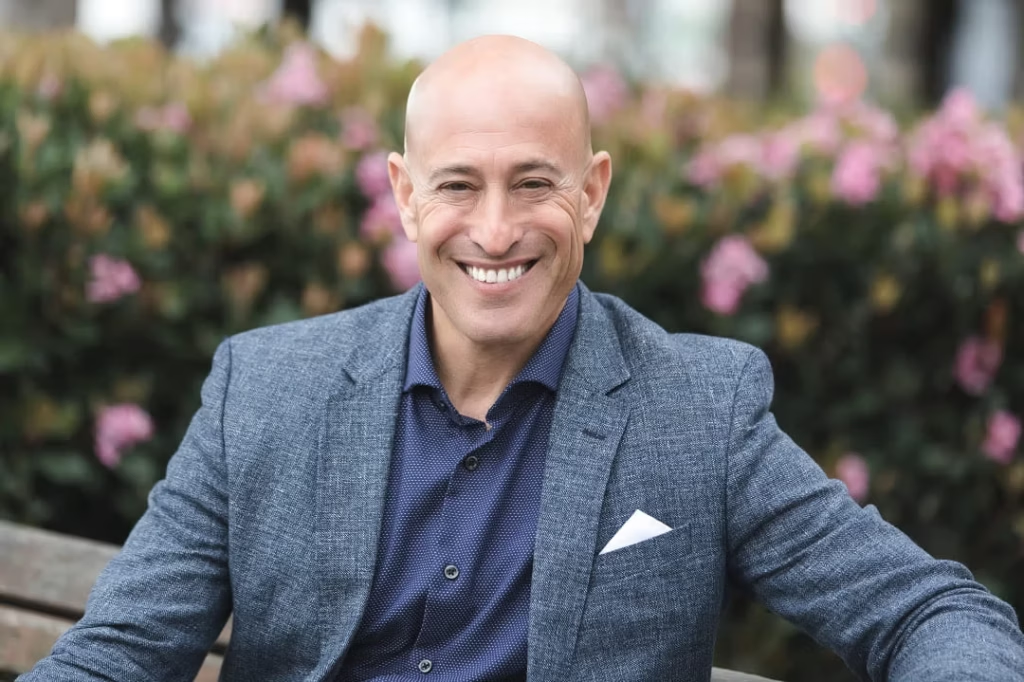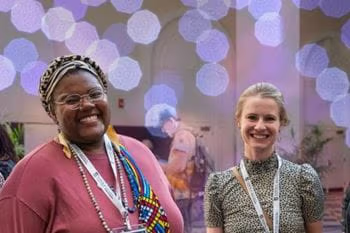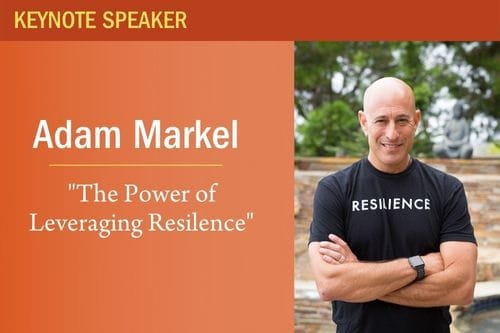On Thursday, June 23, 2022 at 7:00 PM (ET), the American Montessori Society will host a Member Appreciation Day as a way of showing appreciation for you, our members. This free event for AMS members features reports from AMS leaders, highlights of the 2021 – 2022 membership year, and a special keynote presentation by Adam Markel.
Meet Adam
As one of Huffington Post’s top speakers to see, the bestselling author of Change Proof, and the #1 Wall Street Journal bestseller Pivot, Adam’s messages have inspired tens of thousands worldwide. His keynotes, corporate workshops, and business mentoring integrate practical business strategies, personal development insights, and a unique delivery style to create a high-energy and impactful learning environment.

Adam is currently the CEO of the More Love Media Group, a TEDx speaker and influencer, and host of The Change Proof Podcast, facilitating insightful discussions with business leaders and social innovators and exploring breakthrough strategies to fully embrace an uncertain world and build the resilience required to become Change Proof.
Adam will be presenting on the idea of “Bouncing Forward” and will talk about how we can leverage resilience for our long-term success.
A Conversation with Adam
Anita Hanks: Thank you for taking time to chat with me, Adam. I’m really looking forward to seeing your presentation at Member Appreciation Day. When we first spoke, you said you identify as a teacher. What is your background with education and how has your role as a teacher impacted your life?
Adam: Thank you, Anita. It is my pleasure to be with you today. I’ve been around educators all of my life so it was only natural that I started my professional life as a junior high language arts teacher in my early 20s in New York City. Frankly, it was probably the toughest job I ever had, yet I learned so much. My audience then were young kids, early teens. They were all at once fun, energetic, amazing, difficult, and challenging. As a result, I had to learn to think on my feet, be clearer, and present to them in an engaging way. I didn’t want to be “that teacher” that I remembered from growing up—the uninterested one. I wanted to be the “cool teacher,” the one that actively engaged with them and could actually help them. I had to raise my game quite a bit. Today, on some level I still consider myself to be a teacher, albeit with a different audience. I realize how much those kids helped shape the training and development work I do today in the form of keynote speaking and workshop facilitation.
Anita: In Pivot, you discuss discovering your true purpose and pivoting it. We define our purpose in Montessori as our cosmic task. Can you explain more about what pivoting to one’s purpose means as a process and not a plan?
Adam: I refer to it as a process vs. a plan because for me, it’s about creating the structure for any type of pivot or reinvention, whether in your personal or professional life. It’s less about starting with a plan at the outset and more about the process of discovering what it is that you want. As you put it, it’s about the process of discovering our cosmic task. Foundationally speaking, it’s important to ask yourself the tough questions and explore things like what it is that you’re looking to create, what your identity has been and might be going forward, what hasn’t worked for you, etc. These are process type explorations instead of rushing right to the creation of a plan. First, we need that clarity. The beginning of the book Pivot is all about creating clarity—or “clearing of the windshield”—so you can see down the road before you start to commit to any planning.
Anita: One of my favorite quotes from your book Pivot, is “When in doubt, grow.” In Montessori, we value life-long learning. What advice would you give to educators today about ongoing professional development and growth?
Adam: There is absolutely nothing more important than committing to continuous and never-ending self-improvement (or CANSI for short). This applies to both our personal and professional realms. Being committed to growth and learning new things, in my opinion, is the key to remaining vital, relevant, and valuable in any endeavor that we choose to engage in. The moment we are closed to learning and are not in a growth mode, we are in the opposite mode. And none of us want to be there. Yet when we close ourselves off by thinking “we know that” (3 of the most dangerous words in the English language!) and are not open to learning new things and having new experiences, being humble and looking at things through the lens of a beginner or an apprentice even, we lose a valuable growth edge so critical to maintaining our vibrancy and impact in the world.
Anita: How do you define resilience and what is most important to understand when it comes to resilience?
Adam: Resilience is about our capacity to leverage uncertainty, and even adversity, as a catalyst for our growth. Building resilience requires us to reset, restore, and regenerate our energy consciously and routinely. Resilience is not what so many people think—that it’s about “bouncing back” from setbacks or just being able to endure whatever it is that has come our way. It’s really the opposite—it’s being able to “bounce forward.” This requires recovery, not endurance through suffering. It’s about how we choose to restore ourselves in the face of adversity, uncertainty, and even catastrophe so that we are stronger as a result and able to remain resilient moving forward.
Anita: What role do habits and rituals play in being resilient?
Adam: An important part of creating resilience is ritualization. What I often say is that we need to “ritualize to habitualize.” What I mean by that is consciously creating routines for moments when we are in recovery mode. These rituals will help us manage our energy. Higher energy enables us to think more clearly, maintain our focus, and help us to act strategically if action is called for. In my keynotes, I talk about going back and forth, or toggling, between our energy and recovery states. And, it’s just as important to manage our high energy state as it is when we find ourselves in lower energy states and need to raise our energy by taking better care of ourselves to replenish our energy. Finding the right mix of the two throughout the day is the recipe that we all craft for ourselves. Then, it’s important to practice and perform those things to determine the right grouping that helps be at our optimal best throughout the day.
Anita: Your viral TEDx Talk guides people to start their day with love. A love of life is inherent in the Montessori philosophy for both adults and children. What is one thing we can all do each day to stay passionate and engaged in our work?
Adam: For me, gratitude is the foundation for creating a love of life, no matter what. I highly recommend that gratitude rituals are part of our recovery “recipe.” Building on what I said earlier, when we’re depleted and find our energy gone, our passion tends to run out. When this happens, we can start to lean into the negative, focusing more on challenges which can lead to dissatisfaction and a lack of engagement with our work situation. What’s therefore important to consider is including a good dose of emotional and spiritual resilience rituals, in which we stay in a peaceful place with an open heart.
Anita: AMS members are being asked to complete a brief resilience assessment prior to your presentation on June 23. What does the resilience assessment entail?
Adam: In order to build your resilience, it’s important to understand your starting point. The Resilience Assessment is an online survey, composed of 16 multiple choice questions that literally takes about 3 minutes to complete. The assessment results provide an indication of your resilience level in 4 specific areas: Mentally, emotionally, physically, and spiritually. This baseline understanding will help you to determine where you can use some support and focus your resilience-building efforts.
See You at Member Appreciation Day
We thank Adam for his time and look forward to spending more time with him at Member Appreciation Day. After Adam’s presentation, there will be time for a live Q&A so be sure to bring your questions and thoughts to Adam on June 23.



